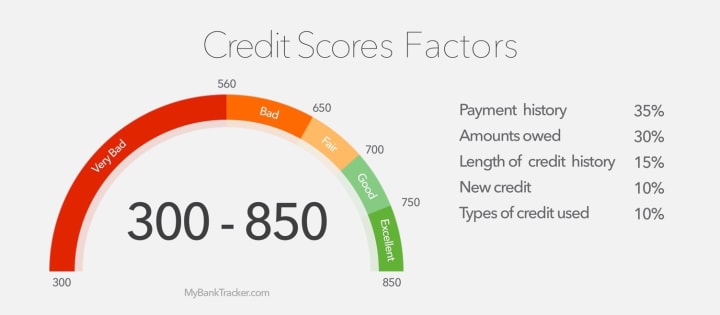The Millennials Guide to Building Credit
It's time to start building a good credit score! Follow this ultimate millennials guide to building credit for better financial records.

Many of the younger generations don't know much about stocks and even owning credit cards and the importance that revolves around it. Most of them simply believe that a credit card is a concept of borrowing money from the company and eventually paying it back. Even though that's the idea, it's much more than just that. Yes, we use credit cards to borrow money and soon pay them back, but using credit cards can help you build a credit score.
A credit score is an analysis of a person’s credit files. It represents the creditworthiness of an individual and a credit score is usually based on a credit report information that’s most likely sourced from credit bureaus. Overall, lenders use credit scores to evaluate the probability that an individual will repay their debts and it usually ranges from 300 to 850. However, the higher the score, the more financially trustworthy the person is seen to be. If you want to start building your very own credit score, this is the best millennials guide to building credit to start following. Plus, having a great credit score is a great way to identify your financial goals.
Why Having Credit Is Important

For starters, having a credit score is super crucial in life. Especially when you plan on buying big purchases, it’s very important to have a credit score. But not just any credit score, you must have a good score. Your score is usually determined on what type of interest rates you gain when you take out loans for big purchases like a house or cars.
While you certainly need a high score to take out loans, the lower your score is, the higher your interest rate will be. And in order to build a good credit score, using credit cards is the best step in achieving that. Also, when you do build high credit scores, it’s the key to financial independence!
What Your Credit Score Takes into Account
From the millennials guide to building credit, there are multiple types of credit scores to have. However, the best one that you should put the most focus on is your FICO score. Your FICO score is your main focus, because it’s the most widely used score.
Your FICO score is based on five majors sections: payment history, amounts owed, length of credit history, new credit, and types of credit. All of these takes a toll on your credit score, depending if you’re on top of it or not. For your payment history, your FICO score jots down the due dates into your account and letting you know when to pay your bills on time. While it shows your amounts that are owed, the lower the better. Length of credit history tells you to start taking out credit and new credit applies your new credit that can make a change to your score.
Keep your balances low by paying every time and on time.
In order to build a high credit score, you have to, have to keep paying your balance more than the minimum to show that you're on top of your game and willing to pay much more than requested. You want to show your bank and credit card company that you can handle paying back the money that you borrowed.
Every month, your credit card company should send you a letter of your balance, the payment due date, and your purchase history. Even though it's nearly impossible for your credit card balance to be zero since we use our credit cards pretty often, keeping it at a very low balance every month can raise your credit score. Even paying large payments every month can boost your credit score. You simply need to be on top of your credit card to build a good score.
Keep a low credit utilization ratio.

Don't splurge with your credit card if you know that you'll take forever to pay if off. Just use your credit card when you need to and fully pay off the balance every month. I know, it's a total tease when you see your credit card in your wallet with so much debt in it, but you still want to use it.
Balance out the use of your credit card. Spending the amount you can pay off. If you're using your credit card a lot, and struggling to pay off the debt, it won't look good on your credit score. From the millennials guide to building credit, always spend what you can pay off. Then I guarantee your credit score will be higher than ever.
Apply for the right credit card.
Applying for credit cards can be a fun experience, because you can see which credit cards come with benefits like rewards, cash backs, and even traveling perks. But as a beginner, we all should start off slow. If we jump to major credit cards, we won't be able to handle it. So, it's best if we start off slow.
Be wise when picking a credit card. The majority of people usually go for secured credit card, and you’ll most likely find these at your bank or credit union. Secured credit cards require a security deposit, and this serves as a form of security against your credit line. And always remember to pick a card you believe you can handle.
Automate your credit card payments.
When it comes to that time of the month again and you need to make a payment on your credit card, automating it is a much better option than manually making payments. Sure, you can make the payment yourself, but wouldn't you want your credit card company to take the payment right out of your bank account without having to lift a finger?
If you know the payment amount that you want to put onto your credit card balance every month, why not automate your payments? This way, you're never ever late to pay your balance and the credit card company won't charge your for a late payment. Plus, your credit score will be high, too, and you won't have to worry about it dropping. Automating your payments is certainly one of the better tips from the millennials guide to building credit.
Carrying debt is actually good for your credit score.

Believe it or not, carrying debt is actually great for your credit score. A large percentage of millennials believe that carrying debt will do no good to their credit score. But it’s actually the opposite, it does wonders to your score! You can build your credit score by having a bit of debt in your balance and still paying it off.
While you have some debt in your credit card account, you actually need to pay a bit of the balance off every month. You also shouldn’t have a high debt in your credit card balance and barely paying it off. This can take a toll on your score. Just make sure you’re always on time with your payments each month.
You can have multiple credit cards to build a good credit score, but be careful.
Among the millennials guide to building credit to follow right now, you can certainly have a couple of credit cards to build a good credit score. Sure, you can simply have one credit card, but why not get two or three? If you're capable of making large payments for each of your credit cards a month, then there's no reason why you shouldn't have a few more cards.
In fact, you can build a high credit score this way. If you're able to pay back the money you borrowed from your credit cards, then this shows that you can certainly pay off loans in the future. Just be careful of your decision—do it if you know you can!
How Your Credit Score Is Calculated
If you've got the skills or not, calculating your credit score isn't as difficult as you think it is. It's mainly based on percentages. Your payment history is 35 percent, current credit utilization is 30 percent, credit history length is 15 percent, new credit inquiries is 10 percent, and credit mix is 10 percent.
All of these percentages revolve around how you're handling your credit card. From the amount you spend to the amount you pay off and meeting with deadlines, your credit score is all about you taking care of your credit card. So, calculating the score isn't that hard to do. Once you've got the information down, you can easily calculate it to see what your credit score is manually.
Finally, from the millennials guide to building credit that you should follow is getting rid of paid delinquencies on your credit reports. A delinquency is when you miss the second payment of your credit card. And this looks really bad on your credit score and reports. But after you've paid the delinquency and got over it, it still shows on your reports.
However, you can actually get rid of the paid delinquency right off of your credit reports. How? By negotiating with your creditor or finding and challenging mistakes in the reported item. A great app that also helps you get rid of paid deliquesces is Credit Karma! Fully removing deliquesces from your credit report gives your report a fresher look.
About the Creator
Rachel Blanchard
Does hot yoga, has 3 Yorkies and a hamster, and listens to John Mayer religiously.






Comments
There are no comments for this story
Be the first to respond and start the conversation.